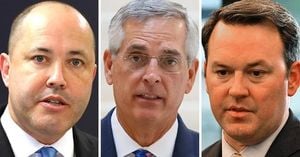On August 15, 2025, Nigel Farage, leader of Reform UK, reignited the debate over the future of Britain’s upper chamber by writing to Prime Minister Keir Starmer with a pointed request: allow Reform UK to nominate peers to the House of Lords. Farage’s demand, which he framed as a bid to address a "democratic disparity," has set off a political storm, drawing sharp rebukes, ironic observations, and renewed calls for sweeping reform—or outright abolition—of the centuries-old institution.
Farage’s letter, first reported by The Times, lays out his party’s case. "My party received over 4.1 million votes at the general election in July 2024. We have since won a large number of seats in local government, led the national opinion polls for many months and won the only by-election of this Parliament," he wrote. Reform UK currently has four MPs in the House of Commons and controls 10 councils in England, but it has no representation in the Lords, which boasts more than 800 members. Farage argues that this absence is a glaring injustice, especially when smaller parties like the Green Party, Plaid Cymru, and the Ulster Unionist Party collectively have 13 peers, and the Liberal Democrats—who won fewer votes than Reform in the 2024 election—have 76.
"None of this holds water any longer given the seismic shifts that have taken place in British politics," Farage asserted. He added that his request was "modest," though he declined to specify whom he would nominate if granted the opportunity. The timing of the letter is no accident: Reform UK has enjoyed a surge in support, winning the Runcorn and Helsby by-election in May 2025 by a razor-thin margin of six votes and making sweeping gains in local elections. Farage has even claimed that Reform is now the main opposition party, a bold statement in the context of Labour’s and the Conservatives’ continued dominance in Parliament.
The process for appointing peers is, as always, a matter of political discretion. A Downing Street spokesperson explained, "The process for appointments to the House of Lords follows established conventions and is guided by advice from the House of Lords Appointments Commission and other relevant bodies. While political parties may make representations regarding peerage nominations, decisions are made in line with long-standing procedures." In practice, the Prime Minister holds the keys to the chamber, sometimes inviting opposition leaders to make nominations, but under no constitutional obligation to do so. In December 2024, Starmer appointed 30 new Labour peers, including his former chief of staff Sue Gray; the Conservatives named six, and the Liberal Democrats two.
Yet Farage’s move has struck many as, at best, ironic. As The Guardian pointed out, Reform UK’s own manifesto promised to "replace the crony-filled House of Lords with a much smaller, more democratic second chamber" within its first 100 days in government. The document even called for an "immediate end of political appointees." The details of this more democratic structure, however, were left vague: "Structure to be debated." For critics, Farage’s demand for peerages now—before his promised reforms—smacks of opportunism. "Before the arrival of a Reform government and the immediate end of political appointees, Farage would like the prime minister to ennoble some political appointees on his behalf," the Guardian observed wryly.
Defence Secretary John Healey was even more direct, dismissing Farage’s call as an attempt to "fill [the Lords] with his cronies." Healey told LBC, "The same Nigel Farage who called for the abolition of the Lords… now wants to fill it with his cronies. I’m not sure that Parliament’s going to benefit from more Putin apologists like Nigel Farage, to be honest." Healey accused Reform UK of being "conspicuously absent" from debates on the Ukraine war, adding, "At this point, when maximum pressure needs to be put on Putin to support Ukraine in negotiations, when the maximum condemnation of Putin is required from someone who is sitting down with Trump in Alaska but turning up the attacks on Ukraine, it needs all voices. And I have to say, the voice of Reform is conspicuously absent in any of our discussions and any of our defence debates about Ukraine and about Russia."
Reform UK’s deputy leader Richard Tice shot back, calling Healey’s remarks "an absurd smear" and questioning whether the Defence Secretary was "suffering from a touch of August sunstroke." Farage himself has repeatedly denied supporting Vladimir Putin, stating that he blames the Russian president for the war in Ukraine, though he has also described Putin as an effective political operator in past interviews.
The controversy has also revived long-standing calls from other parties to abolish the House of Lords altogether. George Adam, a Scottish National Party MSP, noted, "Nigel Farage talking about 'democratic disparity' in the House of Lords whilst completely ignoring the fact that the upper house is wholly undemocratic is somewhat ironic." Adam argued that "the sooner the unelected House of Lords is scrapped the better," adding that only Scottish independence would allow Scotland to escape "this archaic institution for good." Similarly, Maggie Chapman, a Scottish Greens MSP, called the Lords "broken and unfit for purpose" and lambasted Reform as "a toxic right-wing party that thrives on hatred and division." She argued, "A democracy fit for the 21st century would abolish the House of Lords. Such an archaic relic has no place in the Scottish Greens’ vision for our future."
It’s worth noting that the Scottish National Party has no peers in the Lords—not out of neglect, but as a matter of principle. The SNP opposes the existence of the chamber and refuses to participate in its proceedings. The Green Party, on the other hand, has managed to secure nominations in the past, thanks to the discretion of previous prime ministers. David Cameron and Boris Johnson both allowed the Greens to nominate peers, even as the ultimate decision always remained with the head of government.
Farage’s letter, then, can be seen as a shrewd piece of political theater. According to the Guardian, "His letter is a classic August news story, designed to get attention and to drive home the point that Reform, the most popular party in the country, is treated as unrespectable by the establishment parties." By making a public demand he knows is unlikely to be met, Farage reinforces his outsider status at a time when anti-establishment sentiment is running high. The very fact that Reform UK is excluded from the Lords, he suggests, is proof of the system’s bias against insurgent parties.
Meanwhile, the constitutional machinery grinds on. The monarch, as ever, acts only on the advice of the Prime Minister, who may or may not choose to invite opposition leaders to make nominations. The House of Lords Appointments Commission provides guidance, but the final say rests with the government of the day. As the debate rages, the upper chamber remains, in the words of its critics, an "archaic relic"—and, for now, Reform UK remains on the outside looking in.
The clash over Lords appointments has exposed not only the sharp divides over Britain’s constitutional future, but also the contradictions and calculations that shape party politics. One thing is clear: the question of who gets a seat in the red benches is far from settled, and the battle over the future of the Lords is likely to continue for some time to come.





